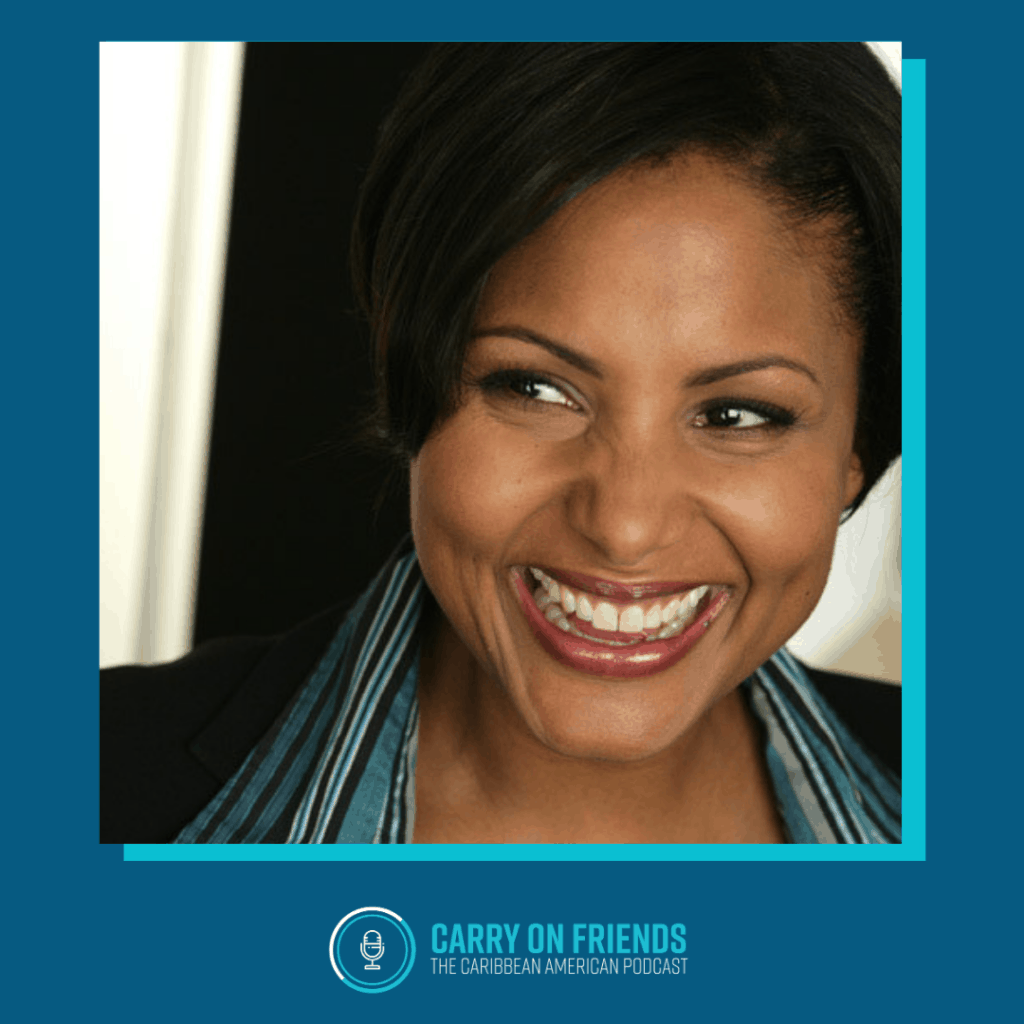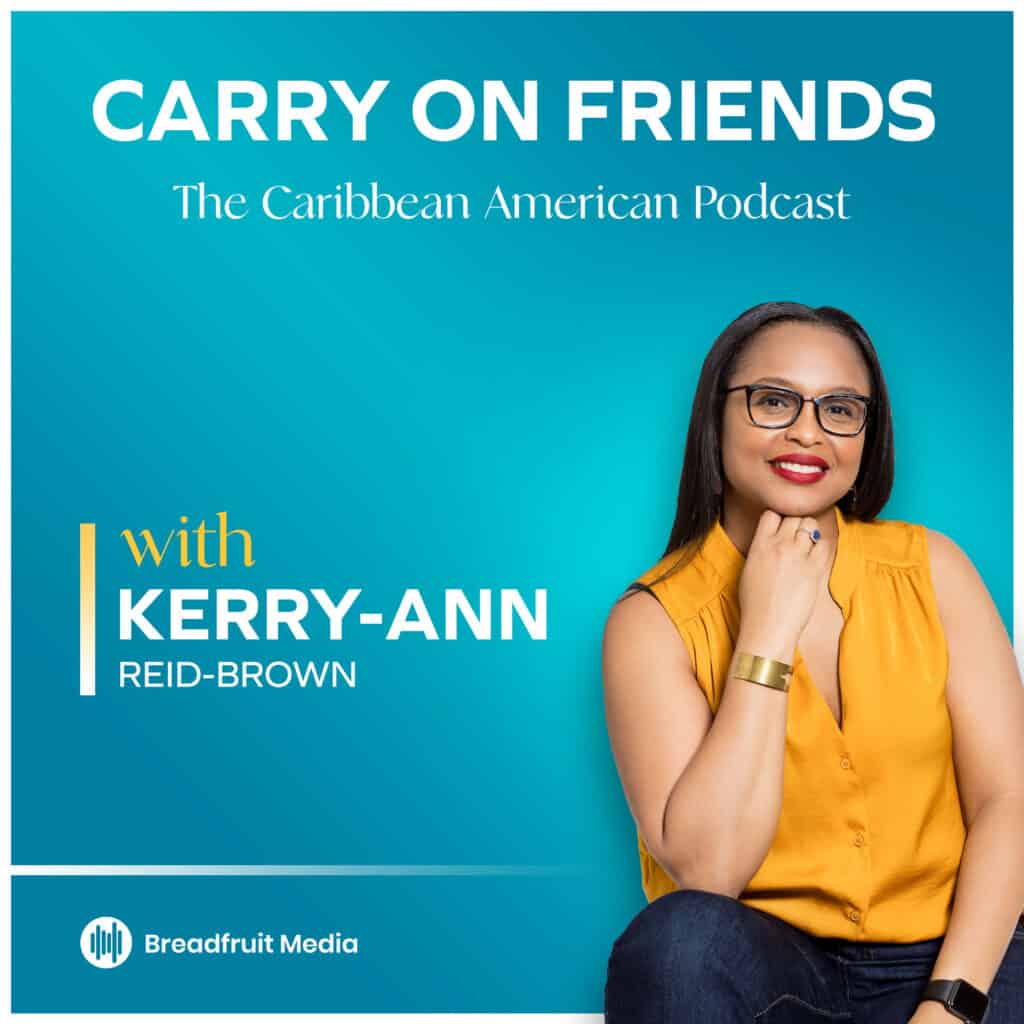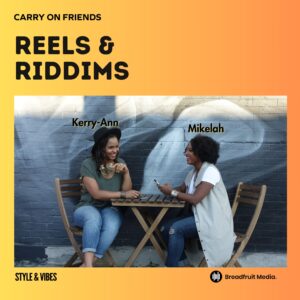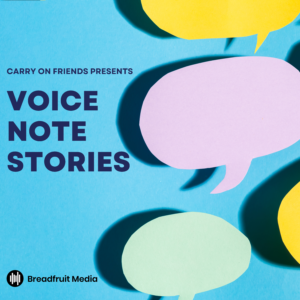
Conch Shell Productions: Bringing Caribbean Voices to American Theater
Conch Shell Productions: A Call to Action
“A Conch Shell was a device used for centuries by many people, whether you’re from Africa, or you’re a native of the Americas, to call to action.” ~ Magaly Colimon-Christopher
Conch Shell Productions is the brainchild of Magaly Colimon-Christopher. Magaly is a Haitian-American actress, playwright, director and producer. In this episode, she shares why she started Conch Shell Productions, Hear Her Call Theater Festival – featuring new plays by Caribbean American women and the importance of Caribbean American voices in American Theater.
“We hyphenate our heritage not to separate but to celebrate.” ~ Magaly Colimon-Christopher
About Conch Shell Productions | Support Conch Shell Productions
On Social @carryonfriends – Twitter | Instagram | Facebook
Transcript
Kerry-Ann: Hello everyone, Welcome to another episode of Carry On Friends, the Caribbean American podcast and I am excited. I am actually recording this episode in the green room of in the performing arts theater at York College and my guest today is Magaly Colimon Christopher. How was that?
Magaly: That was awesome. That was good. You got the right intonations, you got my name down.
Kerry-Ann: I’m learning, I’m learning. So Magaly, Why don’t you tell the community of friends a little bit about who you are?
Magaly: As she said, my name is Magaly Colimon Christopher. I am an actress, playwright, director, producer, and I’m the founder of Conch Shell Productions. Now, the mission of Conch Shell productions is for us to showcase develop, produce the voice of the Caribbean, American artists, that means 28 nations, people from the 28 nations move to the Americas to start a life, start families on a new land, what voice do the children of those people and the grandchildren and great grandchildren of those people have? What’s unique about it, and of course, it’s going to be unique. I am a Haitian American, first generation; my mom took a plane from Haiti and landed in JFK. And I’ve been in New York for most of my life. And as an artist, I struggled to learn to own my unique voice, accepting that I will, as a writer, tell stories from the Caribbean American perspective, and accept that the audience has a learning curve to go through that they may think that’s not my story, because it’s not American. And they’ll going to have to learn that yes, it is an American story, because America is a country filled of people who came from somewhere else to get opportunities. Here is the migration story. That is the human story. And our story. As Haitian American or Trinidadian American, you can hear an actress in the hallway is a Trini American, a Jamaican American or St. Croix American, or Tortola American, whatever your story is, it’s an American story. And that should be on American stages. And while my passion is to build a community of Caribbean American and Caribbean audiences, my thorough mission is to build an American audience for our unique perspective what it means to be an American.
Kerry-Ann: Right, because we’re neither fully Caribbean neither not fully American. So we need stories that represent the duality of that existence because we have a foot in both worlds. And it’s almost like, either, you know, well, some people give me the exception, because I was born in Jamaica, but some people feel they’re not American enough or they’re not Caribbean enough whether you’re Haitian, Trinidadian or Jamaican.
Magaly: And it’s our job to redefine it for ourselves.
Kerry-Ann: And I think even listening to the questions, it was creating our own space, which is what Carry On Friends has been trying to do where the same thing where we’re not, you know, we’re talking about topics that resonate with a small group, a subset of a larger population, and people don’t always get why, but we know why. Because we like you said, we need to create safe spaces for ourselves to have this conversation so
Magaly: And also to inform the world what our story is. We’re not stereotypes. We’re, full 360 degrees, multi dimensional individuals. Listened to our story. That’s my goal.
Kerry-Ann: So this play or this festival Hear Her Call is the perfect Capstone to Women’s History Month, and just saw some amazing 10-minute plays about that. Playwrights that represent different aspects of the diaspora and talking about topics that are highly relevant. By the time they hear this episode, the plays that have gone but my favorite was Fall because I identified with how, as a Caribbean American woman, you struggle with how you were parented by your mom, and why they were so mean. And then, you know, the dialect or the finding out that there are similarities between the Jamaican American daughter and the Haitian American Nurse’s aide if you would want to call them, or even the experience of the Cuban and the food, like, you know, I’ve had friends who said that they’ve never had American food until they were well into high school or college. And when they do go to another person’s house, it’s almost like, I don’t understand it, there’s a huge disconnect. So what was very particular for you in creating this first festival under Conch Shell Productions? Right, the first one,
Magaly: Yes. First, Hear Her call,
Kerry-Ann: Hear Her Call. What was the inspiration for allowing this first festival to revolve around the voices of Caribbean, Caribbean American women?
Magaly: It’s a known fact that in the industry, overall, the women’s voice is not heard as much as the man’s voice. Forget a Caribbean American woman’s voice. So I wanted our first festival as an organization to be one that focused on the voice of the Caribbean American woman. And one of my missions, also at Conch Shell is to produce work that inspires social change. So when I came up with the name of the festival, Hear Her Call, what is the call? Because we’re called Conch Shell Productions, a Conch Shell was a device used for centuries by many people, whether you’re from Africa, or you’re a native of the Americas, to call to action.
Magaly: To inspire awareness. So we are theater that awakens. So I wanted to hear different perspectives on what women wanted the world to hear. What women wanted to change. And I didn’t want the storytelling to have the same devices use I didn’t want the same storytelling device at all. Because I think sometimes when people think of Caribbean theater, they think of proscenium stage, I think of the quote unquote, mom on the couch play, where it’s not about social change. It’s more about day-to-day life. And I was grateful when I got the submissions I got, because it inspired me to think yes, there are other people like me out there. And the last play that I produce was my own play called the Hunting Season that was in the festival last August. And it was about Haitian American mother who has this premonition that her unborn son is going to be hunted and killed by the police. So it’s a magical realism piece because she invokes spirits to help her. And so when I when I put that piece up, people were like magical realism. Caribbean, it’s like the mixture of magical realism is a given, in my opinion, because part of our culture, but they’re not used to seeing that in theater, per se, they may see it in Shakespeare. But when you really think about August Wilson, for example, he had magical realism all over his place. That’s what the African people embrace deep down inside the belief in the spirits and the powers to change your life. So my inspiration to focus in the woman’s voice is personal. I have to represent my sisters.
Kerry-Ann: So in the beginning, when we just recorded, you said you, your struggles with your identity, what, tell us tell me a little bit about that struggle. And where are you in the struggle? Because I think the playwright who had to leave early for another rehearsal, she kind of hinted at what you might say, is, our reality.
Magaly: Yeah, France-Luce Benson had to leave earlier. She’s a lovely, amazing writer. I grew up in a household where you walked in, and you’re not in America anymore. So don’t bring your American behavior here. Don’t bring your American language
Kerry-Ann: Don’t bring your American attitude
Magaly: Don’t bring the American attitude. And so I was proud to say I was more Haitian than American, because I knew my Haitian culture. I knew about you know, Dessalines, Henri Christophe, I knew about my great, great great grandmother, who came over from Norway, I knew about my great, great grandfather who had a farm and married her, you know, I knew I didn’t know anything about America. My mom didn’t tell me those stories. So in my head, I was Haitian. But then I went to Haiti, and they were like, you’re an American. I’m like, What? No, no I’m not. I’m Haitian. And they’re like you’re American, so get your American stuff up my face. And I, all of a sudden, it broke me. I was a teenager. And I was like, I don’t know where I belong. Because I accepted. I didn’t belong in America, because I was like, the good little girl who did the Haitian girl things that are quiet, because that’s how you’re raised. And so all of a sudden, I was like, I’m not American, and I’m not Haitian. So what am I, and you let it go after a while and you stop thinking about it. But when you’re an artist, the question of who am I is a constant question as an actor. And I would think that and I’m like, I don’t quite know. So I had to make a choice. I am who I decide I am. And I am Haitian, and I am American. I mean, literally, you have to go somewhere else to discover who you really are to realize, you just have to own it, because everybody else knows it. And what I am is a very spiritual human being who as a rich culture behind her. And I live in an environment that’s always educating me on how to love myself more, despite anything that happens around me, and how to claim my magnificence no matter what anything is said. So I think being a Haitian, taught me to believe in my magnificence. And being an American taught me how to embrace it even more tightly.
Kerry-Ann: Yeah. You know, the other day, a student asked me a question, and it was like, What is it like being an immigrant and I’m just like, Well, I mean, I’m Jamaican, that’s one. And you know, part of being Jamaican and part of growing up in Haitian we come from cultures that are so this braggadocio is like it’s larger than life. So we were kind of born with that like, I’m Jamaican like what, but the American element of it allows us to see how we can use that to our advantage to stand out. I think the challenge happens when we look at people within the diaspora, so maybe other black Americans view us and why we stand out a little bit. There’s there are people with challenges, especially if you’re in spaces where you’re the only Caribbean, so we’re fortunate to be in New York. But what about those Caribbean Americans in the Midwest,
Magaly: I’ve been there. I live in Chicago. I live in LA, it’s kind of like you gotta search for the accents you got to search for the other languages is New York is a delicious place to be. It enriches the belief that being not like the average American is ok as everybody else around you speaks languages that you cannot understand.
Kerry-Ann: That is true.
Magaly: The concept of braggadocio, I was talking to my husband the other day and very thought that’s for someone to say, I am amazing, is considered a negative. We, I want to dig into the human psyche, where the first person who decided to thrust that out on an individual was born and tell him never pass that seed down. Because you are, it’s just like, we are amazing creatures, and living in America. And owning the fact that you have a cultural background that is not part of the American quote, unquote story only means that you’re going to feed the American story, because we fed the American story. If you look at the American cuisine, multiple cultures fed the story. So my whole thing about Conch Shell productions is I want to have an inclusivity. I get weary when people say I’m Jamaican, I’m Haitian, and therefore separate. We are of the diaspora. Okay. And we look like you said, the stories had similar themes, different languages, but similar themes were brought together by this Caribbean ocean. So you speak Spanish, so you speak French, so you speak English, so you speak Dutch, it doesn’t matter. We all were brought over in a ship. And then other cultures from other ships, a bunch of cultures got together and made a melting pot. And we were born and we admitted though. In the Caribbean we own it. It’s like, yeah, a melting pot of a person. I’m not one person; I’m a bunch of different people, right? And in America, they’re constantly struggling with, you know, labeling it.
Kerry-Ann: I think that’s the struggle there. There. There needs to be some definition, there’s always this need to define a thing. Whereas it’s just like a everything is everything.
Magaly: Right. Right. There’s safety when you’re in a Caribbean island. There is a culture that built so you can just give away your background, you know. And so in America, it’s so big. You can’t give away your background because you get lost. And the islands are small, like I said, my great grandmother was from Norway, my great grandmother was from Belgium, but they were Haitian. Don’t tell my great grandmother, she’s not Haitian. You know, don’t tell any of the people who the Syrians about the Germans, the Africans, the Cubans, all these people who moved to Haiti. I’m a Haitian what are you talking about. This is where I am. And the need for the hyphenation is not so great, because it’s such a small community. Whereas here, it’s so massive. Yes, you can lose your footing. And in an environment where the conversation about race defines your journey, you have to have something to grasp on to so that you can stay strong through the trials and tribulations of negative thinking. And you know, yes, in the Caribbean, there’s social structure and the social separatism and all that. But the thing is, you still rooted in saying, Yes, I am of this culture, no one’s going to question you. Cause of the pigment in your skin. And so people may feel why are they so busy trying to claim this? Why they trying to separate but we’re not, we’re just trying to celebrate it’s a C word. It’s a C word.
Kerry-Ann: Not separate but not celebrate.
Kerry-Ann: Yeah, definitely. Some of these plays are celebrating life and exploring topics that we need to explore more. So before we wrap up, tell, I know people we’ve missed this festival, but how else can people support Conch Shell Productions?
Magaly: But you know, to me, yes. Is that sound? Celebrate. Yeah. So this is a celebration of a voice. And I want everybody to come, you know, everyone to say, Oh, I didn’t even understand the story was part of the community. They’re not all you know, just struggling to get by and celebrating life.
Magaly: Conch Shell Productions is a product of the community. We are a very small company, we need donations. We have a Fiscal Sponsorship with Fractured Atlas, which means you donate you get the money back. At the end of the year, go to tax man, the taxman give it 100% back because we don’t give gifts. So your donations go straight into producing new work. So this work was a product of me applying for a bunch of grants, and getting a Queens Council, the art grant, and individual donors, donating every penny we get feeds the work. As a matter of fact, someday it’ll feed me. But right now I pay my artists, I produce the work. That’s what my focus is. And the more funds you give me, the more work I can do more I can showcase the Caribbean American voice. Our goal for the company is to produce a film festival, Caribbean American Film Festival, fundraising, send money in donate, knowing you’ll get the money back. Even our crowdfunding campaign that closes today, your money comes back because we have a Fiscal Sponsorship. So it’s like you’re giving to Red Cross, you know, your money will come back to you at the end of the year. But it’ll come back to even bigger, because you’re going to be making an impact, we made an impact on 30 high school students today, we made an impact on the other 50 people who are present, you’re making an impact, bringing hope to people that they can also have an opportunity to have a voice, that there is a stage that’s my whole goal, create a space, you support it. Because honestly, the government can’t support us. When you think about great people like Tyler Perry, who now is a billionaire. But he was a product of going to the community and the community saying yes to Him, and they pay for his plays and other communities saying come bring your play to me. And they helped him build his empire and they love him. But it was the African American community that made him a billionaire. And he’s all his whole, the whole premise of his business model is I got the money. Give me the space. I’ve got the audience, give me the space Conch Shell productions, we need you as an audience member, we need your funding. So when we do a production come out, get tickets, if you can’t come donate to support so that we can reach more and more people.
Kerry-Ann: And,
Magaly: Oh, the website, yes, forgot to share that. www. Conch shell productions. I know it’s really long.com or I am even abbreviated to hear her call.com. So I own both of those domains. And when you go there, there’ll be multiple opportunities for you to click donate, and you’ll go straight to my Fiscal Sponsorship. And every month, every penny you send us, they’ll take us one step forward to our next production.
Kerry-Ann: Awesome. So see if you could finish this sentence. To be Caribbean American is to be
Magaly: Unique, fiery, passionate, driven, out of the box thinker.
Kerry-Ann: All right. And on that note, thank you everyone, for listening to this episode. I’m enjoying recording these episodes on the go. So don’t watch the noise, the background. It’s all part of the energy of the space that we’re in. And until next time, walk good.


